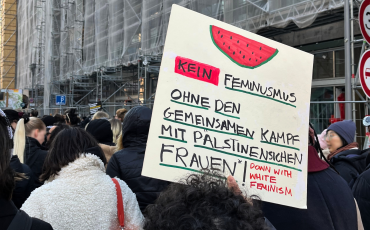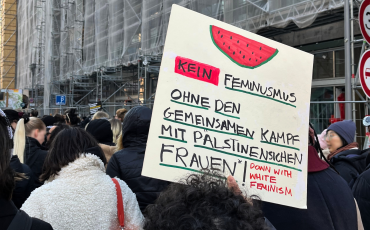To this date, the Oslo Accords of 1993-1995 and follow-up agreements between different Israeli governments and the Palestinian Liberation Organization (PLO) dominate the reality in the Palestinian Territories as well as Israeli-Palestinian relations. At the same time, these arrangements have not led to the end of occupation, Palestinian independence, conflict resolution and reconciliation between the two peoples. They have thus disappointed the hopes with regards to both, a realization of rights and peace making. By Muriel Asseburg and Christoph Dinkelaker
Entrenchment of Occupation and intra-Palestinian Division
The current trends are gloomy: The absence of Israeli-Palestinian peace negotiations since 2014, the blockade of the Gaza Strip, the entrenchment of the Israeli military occupation, settlement expansion and measures of de facto annexation, as well as the one-sided measures of the Trump Administration all contribute to eroding the basis for a Palestinian state and risk to definitely close the door on conflict resolution between Israel and the Palestinians.
On the level of Palestinian domestic politics obstacles to state and strategy building abound as well. The two dominant political movements do not agree on their approach to Israel, amongst other issues. For more than a decade, the West Bank dominated by Fatah and the Gaza Strip ruled by Hamas have been politically divided. Against the backdrop of the failure of the October 2017 reconciliation agreement, power sharing, let alone comprehensive reconciliation, is unlikely to be realized in the foreseeable future.
As a consequence, two parallel authoritarian systems of governance have taken root. The domestic Palestinian scene has been characterized by the absence of national elections (since 2005/2006), a defunct Palestinian Legislative Council, rule by decree and a lack of effective checks and balances as well as corruption and clientelism. No wonder the Palestinian population has lost trust in the president, PA institutions and the factions. Over the last few years, the ruling elite in Ramallah has tried to fend off criticism as well as (perceived) contenders for power and influence by curtailing political freedoms – e.g. through the 2017/2018 cyber crime law, the 2015 amendment of the law on non-profit companies and the draft amendment of the law on charitable associations and NGOs currently under review. They have also relied on an ever greater interference of the executive branch in the judiciary, not least by establishing a loyal constitutional court. Israel’s human rights violations have been compounded by those of the PA and Hamas.
The risk of destabilization has markedly increased amid the worsening financial crisis of the PA and UNRWA as a result of general donor fatigue and the US slashing its contributions. While US cuts have been replaced for now allowing UNRWA to keep its operations afloat, the organization will be forced to reduce its support and cut back employment even further than to date – with detrimental impact in particular on the aid-dependent population in Gaza, but also in neighboring states such as Lebanon and Jordan. As the mid-November conflagration between Gaza and Israel has shown, the risk of military escalation remains severe in the absence of a long-term ceasefire that has the buy-in of both, Israel and Hamas. Also, the risk of violence in the West Bank and East Jerusalem remains high.
German and European Approaches
Germany and its partners in the EU have already adapted to the negative trends and downgraded their ambitions: The objective is no longer to contribute to the realization of a two-state settlement, amongst others by building a Palestinian State, but to maintain the option of a two-state settlement. In this vein, working against territorial fragmentation and erosion of social cohesion have moved to the list of German and European priorities. Instruments have included the approach of differentiation between Israel proper and Israeli settlements in the Occupied Palestinian Territories and an emphasis on development projects serving the most vulnerable populations groups, e.g. in Area C of the West Bank, where Israel retains its prerogative over spatial planning as well as security control and has aimed at displacing Palestinians from strategic locations.
Alas, Germany and the EU have not been successful in their endeavor to reverse the above-mentioned trends. Rather, European cooperation has allowed the occupation and the blockade of the Gaza Strip becoming ever more entrenched, fragmentation to proceed and authoritarian governance to thrive. Therefore, there is a need to rethink approaches beyond the EU review of the modalities of its engagement that is currently under way. The German government has come to be the biggest bilateral donor to the PA and the Palestinians and bears a special responsibility for taking a lead in shaping policies that can be more effective.
Policy Recommendations for the EU and Germany
In this vein, Germany and the EU should be more consistent in their implementation of the differentiation approach. That would include, amongst other measures, setting up a mechanism to monitor member states’ compliance with the guidelines on the indications of origin, support for the efforts of the UNHRC to publish a database of companies operating in Israeli settlements as well as a ban on imports of settlement products as currently discussed in Ireland.
EU member states should also warn the Israeli government of the consequences of large-scale annexations of territory in the West Bank that could occur, for example, in the context of the Palestinian leadership rejecting the “ultimate deal” to be proposed by the US Administration.
Instead of relying on relief and quick impact measures only to alleviate the catastrophic humanitarian situation in the Gaza Strip, Germany and the EU should support talks on a long-term ceasefire that would have the buy-in of all relevant actors, including the de facto government, and allow for ending the blockade and thus reduce aid-dependency and fragility.
Last but not least, Germany and the EU should hold the PA accountable to live up to its commitments resulting from a host of international human rights’ conventions that it has ratified over the last few years. Germany’s political foundations, European NGOs and European governments should unite to prevent the PA law on charitable associations and NGOs being amended in a way that would further restrict the space for Palestinian society.
Palestinian Perspectives on German and European Approaches
In the coming weeks, Palestinian analysts and activists from the West Bank, East Jerusalem, the Gaza Strip and the Diaspora will present their analysis and policy recommendations on various challenges that the Palestinians are faced with, including strategies for facing occupation and annexation policies, approaches to dealing with the Gaza Strip and domestic concerns such as shrinking spaces for civil society and growing authoritarianism. These articles are published in the context of a joint project by the Stiftung Wissenschaft und Politik (SWP) and Alsharq on “When negotiations are at a dead end. Approaches to advancing the end of occupation and Israeli-Palestinian peace“. They complement a series of articles published last year composed by Israeli and European authors on how to address the Israeli political and societal sphere through various approaches and instruments beyond traditional diplomacy.
Dr. Muriel Asseburg is a Senior Fellow in the Middle East and Africa Division of Stiftung Wissenschaft und Politik (SWP), the German Institute for International and Security Affairs in Berlin.
Christoph Dinkelaker is a co-founder of Alsharq and head of Alsharq’s Travel Department. He has worked several years in Jerusalem with the Willy Brandt Center, the Friedrich Ebert Foundation and as a freelance journalist.



















